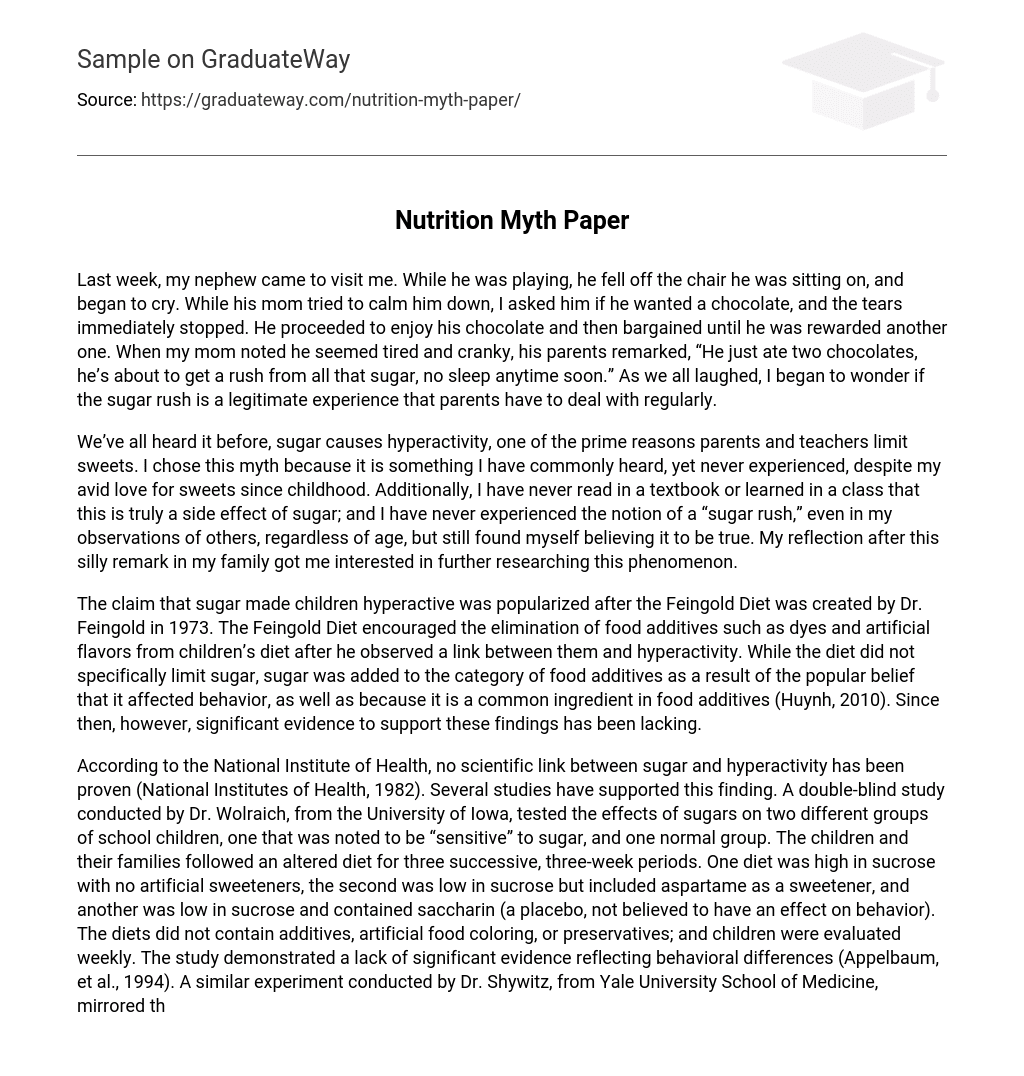Last week, my nephew came to visit me. While he was playing, he fell off the chair he was sitting on, and began to cry. While his mom tried to calm him down, I asked him if he wanted a chocolate, and the tears immediately stopped. He proceeded to enjoy his chocolate and then bargained until he was rewarded another one. When my mom noted he seemed tired and cranky, his parents remarked, “He just ate two chocolates, he’s about to get a rush from all that sugar, no sleep anytime soon.” As we all laughed, I began to wonder if the sugar rush is a legitimate experience that parents have to deal with regularly.
We’ve all heard it before, sugar causes hyperactivity, one of the prime reasons parents and teachers limit sweets. I chose this myth because it is something I have commonly heard, yet never experienced, despite my avid love for sweets since childhood. Additionally, I have never read in a textbook or learned in a class that this is truly a side effect of sugar; and I have never experienced the notion of a “sugar rush,” even in my observations of others, regardless of age, but still found myself believing it to be true. My reflection after this silly remark in my family got me interested in further researching this phenomenon.
The claim that sugar made children hyperactive was popularized after the Feingold Diet was created by Dr. Feingold in 1973. The Feingold Diet encouraged the elimination of food additives such as dyes and artificial flavors from children’s diet after he observed a link between them and hyperactivity. While the diet did not specifically limit sugar, sugar was added to the category of food additives as a result of the popular belief that it affected behavior, as well as because it is a common ingredient in food additives (Huynh, 2010). Since then, however, significant evidence to support these findings has been lacking.
According to the National Institute of Health, no scientific link between sugar and hyperactivity has been proven (National Institutes of Health, 1982). Several studies have supported this finding. A double-blind study conducted by Dr. Wolraich, from the University of Iowa, tested the effects of sugars on two different groups of school children, one that was noted to be “sensitive” to sugar, and one normal group. The children and their families followed an altered diet for three successive, three-week periods. One diet was high in sucrose with no artificial sweeteners, the second was low in sucrose but included aspartame as a sweetener, and another was low in sucrose and contained saccharin (a placebo, not believed to have an effect on behavior). The diets did not contain additives, artificial food coloring, or preservatives; and children were evaluated weekly. The study demonstrated a lack of significant evidence reflecting behavioral differences (Appelbaum, et al., 1994). A similar experiment conducted by Dr. Shywitz, from Yale University School of Medicine, mirrored the same results for high quantities of aspartame (Huynh, 2010). Furthermore, in 1995, a meta-analysis of 23 studies on the effect of sugar on children’s behavior and cognition was published by the Journal of the American Medical Association. The meta-analysis reviewed double-blind, controlled condition studies, consisting of neurotypical children, those with ADHD, and children who were “sensitive” to sugar. Each study consisted of children who were given sugar and others who were given an artificial sweetener placebo. The meta-analysis concluded that, “Sugar does not affect the behavior or cognitive performance of children” (Wilson, White, & Wolraich, 1995). A properly conducted study has been yet to find significant evidence for this myth.
What is interesting, however, is that researchers have found parents are more inclined to report their children are more hyperactive when they believe sugar has been consumed. In one study, parents were asked to rate their children’s activity after consuming a sugar sweetened beverage. Parents, unaware that the drink was a placebo (it was sugar-free), rated their children as more hyperactive (Ansel, 2018). Similarly, in another study, mothers in a randomly assigned experimental group were told that their sons were given a large dose of sugar, and mothers in a randomly assigned control group were told their children had received a placebo, but both groups actually received a placebo. Following the doses, the mothers and sons had videotaped interactions. Mothers in the experimental group rated their children as significantly more hyperactive (Hoover & Milich, 1994). It is shocking how one study from the 70s has carried so much influence in people’s attitudes towards sugar.
From my research, I have found that sugar in fact, does not seem to cause hyperactivity, and children are no exception to this. Although science does not support this myth, the common belief may be due to expectancy and common association due to the persistence of this myth, so reports of these links may be a result of cognitive bias. Likewise, it is important to note that excitement may play a role in the appearance of “sugar rushes.” Many places that individuals are noted to have sugar rushes and consume more sweets, are exciting environments: birthday parties, holidays, etc. These environments are not only stimulating, but behavioral expectations are generally more lenient. Environment may be a confounding factor in these reported “links” (Huynh, 2010). However, this is not to say that there are no other dietary reasons to restrict the amount of sugar in one’s diet. As we have learned in class, excessive amounts of sugar have greater links to tooth decay, obesity, and other health issues. Nonetheless, it will be interesting to discuss the sugar rush with my family next time they visit.





